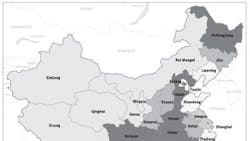Ask Jack Perkowski why so many foreign-owned plants in China are concentrated along the coast, and he'll agree with the analysts who describe it as logistical phenomena. However, don't assume that this has anything to do with the product, components or materials. This China player explains that facility location traditionally has been determined by the convenience of the expatriates -- ease of arrival and departure.
And that's just one aspect of China's management gap, says Perkowski, founder and CEO of ASIMCO Technologies, Beijing, one of the most successful Western-owned manufacturing businesses in China.
Perkowski traces his China gig to 1990 when he interrupted his 20-year investment-banking career at Paine Webber to assess Asian opportunities. That research led, in 1994, to the formation of ASIMCO Technologies, Beijing, one of the first global automotive components companies born and based in China. ASIMCO now has 18 plants scattered throughout nine provinces and three more located in the U.S. "If those plants suffer logistical problems, those issues have nothing to do with the convenience of expat managers -- we don't have them," exclaims Perkowski. "Most of our plants are located in the interior of the country. And while logistics have ceased to be a problem for the interior, those locations continue to maintain low-cost benefits."
Also, in 1997, ASIMCO formally switched to a policy of employing native-born Chinese managers, he explains. Developing a good, strong local management theme is the most important thing to get right in any China venture, asserts Perkowski. "There is a serious management gap in China. In Western business there is a long history of treating management as a science, but that movement did not come to China until the early 1990s."
Localizing the management of a China venture is both very difficult and very necessary -- for a wide range of reasons. One factor is the advantage local management provides in leveraging the Chinese culture's perspective on costs. He cites the example of the visiting American executive who remarks how economical a local Beijing luxury hotel is at RMB240 ($30). "In contrast a local Chinese manager would find satisfactory lodging in a nearby competitor charging half that."
Perkowski says his hotel example shows why local Chinese executives can have an impressive edge in managing a company. "That's how two different plants making the same product can have completely different cost structures."
Local managements also have advantages interacting with the legal infrastructure. He says Chinese managements can have an almost intuitive skill in understanding the Chinese legal system. "An American manager in China usually tries to resolve legal disputes the way it's done in the U.S. -- via the contract and a lawyer. The Chinese manager, without hesitation, knows what local official he needs to see to resolve the problem."
Another confusing issue is that while China has a reputation for strong central planning, its government really happens to be a very decentralized operation. He says there is a Chinese saying that "the mountains are high and the emperor is far away."
Perkowski emphasizes that importance of local government officials. "That's why all of our plants in China are managed by Mainland Chinese, professionals who have had prior experience with multinationals. We got them through headhunters, newspaper and Internet ads, referrals and word-of-mouth. We've also initiated a leadership development program to dig down into the organization to find candidates."
Perkowski admits to the challenge of establishing the necessary degree of trust across cultures, but he argues that trust is also a major difficulty with expats that typically have a China assignment for only three years. Summing up, he says that "in China everything is possible, but nothing is easy."
FDI In China By Region
